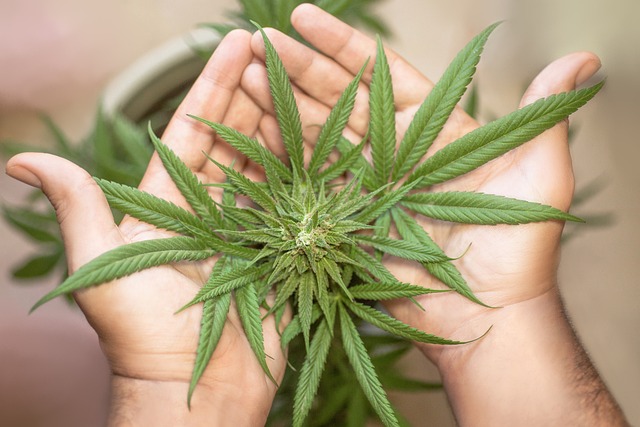In Tennessee, THCA, a non-psychoactive cannabinoid found in hemp, is legally permissible under state law for therapeutic use by individuals with severe epilepsy and other debilitating conditions. The THC content must remain below 0.3% to align with state regulations. Users must comply with Tennessee's hemp program regulations, which include rigorous testing for THC levels and purity. It's crucial for consumers to stay informed on legal changes as they occur, considering the dynamic nature of state laws regarding THCA products. THCA flowers are now legal in Tennessee, thanks to their federally legal status under the Farm Bill of 2018 and adherence to state regulations. While THCA is considered safe with mild side effects like dry mouth and eyes, dizziness, fatigue, or anxiety, it's advisable for individuals to consult healthcare professionals before incorporating THCA into their health regimens, especially given the potential for individual sensitivity differences. Consumers are urged to follow dosing guidelines and purchase products from reputable sources to ensure safety and efficacy. This summary underscores the importance of understanding the legal status and responsible use of THCA in Tennessee.
Exploring the nuances of THCA flower usage within Tennessee’s legal confines, this article sheds light on the implications and potential side effects of its consumption. Delving into the complexities surrounding THCA’s legal status, we provide clarity on where it stands in Tennessee. Furthermore, the piece offers a comprehensive overview of the health considerations associated with THCA flower, ensuring readers are well-informed about both the legal and physiological dimensions. Join us as we navigate this emerging landscape in Tennessee, where cannabis legality meets personal well-being.
- THCA Flower Usage and Its Implications Under Tennessee's Legal Framework
- Understanding the Potential Side Effects of THCA Flower Consumption
- Navigating the Legalities and Health Considerations of THCA Flowers in Tennessee
THCA Flower Usage and Its Implications Under Tennessee's Legal Framework

Under Tennessee’s legal framework, the status of THCA flower, a non-psychoactive cannabinoid found in the Cannabis sativa plant, has been a subject of evolving legislation. As of the knowledge cutoff in 2023, Tennessee law permits the use of low THC cannabis for therapeutic purposes under certain conditions, primarily for individuals with severe epilepsy and other debilitating medical conditions. The legislative definition under the Tennessee Medical Cannabis Act specifically excludes products containing higher than 0.3% delta-9-tetrahydrocannabinol (THC) from legal protection. However, THCA, which is non-intoxicating and exists naturally in hemp, falls within this threshold, making it a legally permissible substance within the state’s hemp program. Consumers interested in THCA flower must ensure that the product they are purchasing complies with Tennessee’s hemp regulations, which include stringent testing for THC levels and other contaminants to maintain safety and quality standards. It is crucial for users to stay informed about the latest legal developments as state laws can change, potentially affecting the legality of THCA flower and its derivatives in Tennessee. Users should also consult with healthcare professionals before incorporating THCA flower into their wellness routines, especially if they are considering it as part of their medical treatment plan.
Understanding the Potential Side Effects of THCA Flower Consumption

THCA, or tetrahydrocannabinolic acid, is a non-psychoactive cannabinoid found in the cannabis plant that is known to convert into THC, its psychoactive form, when exposed to heat or light. As interest in cannabis derivatives grows, consumers and regulators alike are increasingly focused on understanding the potential effects of different cannabinoids, including THCA. In Tennessee, where the legal status of certain cannabis products can be complex, it’s crucial for individuals considering THCA flower consumption to be well-informed about its side effects.
The side effects associated with THCA are generally milder than those of its psychoactive counterpart, THC. Common side effects may include dry mouth and dry eyes, which are typically temporary and can be managed by staying hydrated and using artificial tears or eye drops. Additionally, some users might experience dizziness, lethargy, or anxiety when consuming THCA flower. It’s also worth noting that individual responses to cannabinoids can vary significantly due to factors like metabolism, body chemistry, and tolerance. Consumers should start with a low dose to gauge their reaction and proceed cautiously. The legal landscape of Tennessee requires clarity; as of the knowledge cutoff date, certain forms of THCA are legally permissible under state law, while others are not. It’s imperative for individuals to be aware of the specific laws in their area before engaging with any cannabis-related products. Understanding the nuances of THCA legality and its potential side effects is essential for a safe and informed consumption experience.
Navigating the Legalities and Health Considerations of THCA Flowers in Tennessee

In Tennessee, the legal status of THCA flowers has been a subject of discussion and legislative evolution. As of recent updates to the state’s laws, THCA flower is legally permissible under certain conditions. The Agriculture Improvement Act of 2018, also known as the Farm Bill, legalized hemp and its derivatives, including THCA, across the United States, provided they contain less than 0.3% THC on a dry weight basis. This federal legislation paved the way for state-specific regulations to govern their use. Tennessee has since established its own framework, allowing residents to legally possess and consume THCA flowers as long as they are derived from hemp and comply with the state’s guidelines.
Health considerations for individuals partaking in THCA flowers in Tennessee are paramount. Unlike its psychoactive counterpart THC, THCA does not produce a ‘high’ but is being studied for its potential therapeutic benefits, including anti-inflammatory and neuroprotective properties. However, it’s crucial to approach any substance with caution, as individual responses can vary. Potential side effects may include dizziness, fatigue, or anxiety, especially at higher doses. Users are advised to consult healthcare professionals before incorporating THCA flowers into their wellness regimen, particularly if they have underlying health conditions or are taking other medications. Adhering to the recommended dosage and purchasing from reputable sources further minimizes potential risks.
In conclusion, the emergence of THCA flower within Tennessee’s legal framework presents a nuanced landscape for consumers and healthcare providers alike. As outlined, THCA, while legally permissible under certain conditions in Tennessee, carries its own set of side effects that are critical for users to be aware of. Navigating both the legalities and health considerations associated with THCA flowers requires careful attention and a comprehensive understanding of their implications. It is clear that consumers should approach THCA flower use with caution, considering the potential impacts on their well-being. As research continues to evolve, staying informed about the latest findings within this developing area will be essential for those interested in the therapeutic properties of THCA while residing in a state where it is legal.
